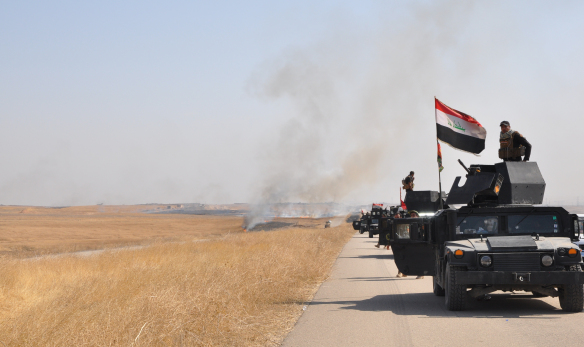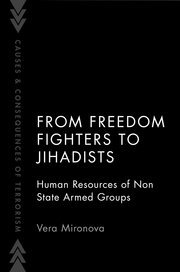
© Vera Mironova, 2016
When a professor first told her it was impossible to go to certain conflict zones to conduct research, Vera Mironova heard a gauntlet drop and set herself on an uncharted course through some of the world’s most dangerous places.
Her first experience with field research was in Croatia and Bosnia, doing research on post-genocide studies, the behavior of fighters, and on the post-conflict division of societies.
“People were not sure anyone could do research in conflict zones, or wanted to do it, but I realized we needed to go to these places to talk to these people, even though others said it was impossible,” Mironova said. “My co-author Sam Whitt and I only announced that we had done it after we had collected all our data in Syria.”
Mironova has now done research in active conflict zones such as Yemen, Iraq, Ukraine and the Palestinian territories, and in post-conflict regions such as the Balkans, DR Congo, Rwanda, Burundi, Central Asia, Bangladesh and Myanmar, and in the Caucasus.
Before this, she did her undergraduate work in Russia, where she was born and raised. During her undergraduate studies, Mironova would come to the United States in the summer to work seasonal jobs to save money, such as working as a cleaner in a motel in New Jersey.
Mironova left Russia permanently when she was 21 to pursue her graduate work. She finished the coursework for a doctorate in economics at SUNY Stony Brook, before transferring to political science studies at the University of Maryland.
While at the University of Maryland, she became a START Terrorism Research Awardee, and she received her doctorate in 2017. For three years, she was an International Security Fellow at the Robert and Renée Belfer Center for Science and International Affairs of the John F. Kennedy School of Government at Harvard University.
“I didn’t want to do economics anymore because they don’t do complicated ethnographic field work in economics,” Mironova said.
Though nomadic by nature, home to her is Massachusetts, where she lives with her husband and three cats.
“My husband is very supportive of my lifestyle,” Mironova said. “He’s in computer science, and he doesn’t know anything about what I do. He says, ‘War, prisons, that’s girl stuff; I don’t know this.’ But I don’t bring my work home. We don’t talk about what I do, or else he would worry.”
The thrill-seeking field researcher in her is juxtaposed against an intently scholarly writer. She’s published extensively, in academic journals like the Journal of Peace Research, the Journal of Conflict Resolution, and the British Journal of Political Science, as well as in broader media such as Foreign Policy, Foreign Affairs, the Boston Globe, and the Washington Post.
Mironova also co-produced the documentary “Exiled: The Plight of Rohingya Muslims,” which is about the history of the relations between Rohingya Muslims and the Myanmar government. The documentary has received the Oniros Film Award, as well as awards from the Marda Loop Justice Film Festival and the LA Film Festival.
Her book, “From Freedom Fighters to Jihadists: Human Resources of Non State Armed Groups,” in which she details her experiences being embedded with Iraqi Special Forces and interviewing members of the Islamic State, was the first title published in the START-Oxford University Press book series.
To conduct the research for her book, Mironova tried to fully immerse herself in army life, and grew close to the soldiers that she was embedded with.
 “I lived with them. I went on every mission with them. I went with them to escort food convoys or just to pick stuff up. I went when they went to fight,” Mironova said. “I wanted to be a part of them—if they needed me to wash the car, I’d wash the car—I needed to show that I could get my hands dirty. I needed to build a relationship with them so they didn’t feel that I was foreign, or that I was different from them. And it worked. They stopped even noticing me after a while.”
“I lived with them. I went on every mission with them. I went with them to escort food convoys or just to pick stuff up. I went when they went to fight,” Mironova said. “I wanted to be a part of them—if they needed me to wash the car, I’d wash the car—I needed to show that I could get my hands dirty. I needed to build a relationship with them so they didn’t feel that I was foreign, or that I was different from them. And it worked. They stopped even noticing me after a while.”
Embedding with Iraqi Special Forces during the Battle of Mosul gave Mironova unprecedented access to members of the ISIS internal security service and ex-ISIS foreign fighters in hiding.
Though setting up the logistics for the interviews could be challenging, once she started speaking with the foreign fighters, she found them surprisingly easy to talk to.
“We talked about everything under the sun, from ISIS things to the fact that it’s good it rained because then they don’t need to water their garden,” Mironova said. “They shared everything about themselves and their families. They would joke with me. They would cook for me.”
More than anything, Mironova sought to understand the men and women who would leave their own homes behind to join groups like ISIS.
“I had to see how foreign fighters lived,” Mironova said. “I had to go into their homes, pick up love letters and personal notebooks. These things that had no military use, but an important research use. I had to find out what it’s like for them to fight.”
In all, Mironova logged more than 600 survey-interviews with local civilians and fighters on the frontline.
Mironova will talk about these experiences and more during her upcoming book talk at START at 12:00 p.m. on October 15. RSVP for the event, “Book Talk: From Freedom Fighters to Jihadists: Human Resources of Non State Armed Groups,” now.
